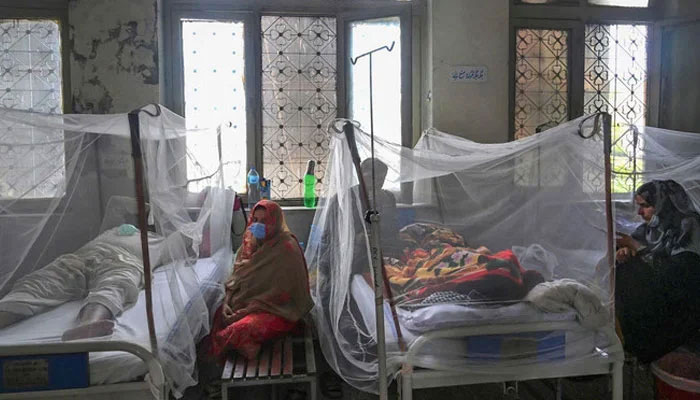Population in capital at risk of facing severe dengue outbreak
Islamabad : The population in Islamabad Capital Territory seems to be at a great risk of facing a severe dengue fever outbreak in the next few days as the number of patients being tested positive for dengue fever from the federal capital has been registering a tremendous increase at least for the last two weeks.
Data collected by ‘The News’ has revealed that well over 700 confirmed patients of the infection have been reported from the federal capital in the last two weeks taking the total number of dengue fever patients from ICT to over 950. Well over 550 individuals have so far been tested positive from the rural areas of Islamabad while the number of confirmed dengue fever cases has crossed the figure of 400 in urban areas.
Data also reveals that the number of dengue fever cases is continuously on the rise in at least eight union councils of Islamabad rural areas including Koral, Rawat, Tarlai, Sohan, Tarnol, Alipur, Sihala and Bara Kahu. The worst affected union councils include Koral, Rawat and Tarlai from where a total of around 450 dengue fever patients have already been reported.
From urban areas in the federal capital, most of the dengue fever cases have so far been reported from as many as 10 sectors including H-13, G-13, I-14, G-7, I-10, G-9, F-6, G-10, G-8 and E-11. The worst affected sectors include H-13, G-13 and I-14 from where over 250 confirmed patients have already been reported.
It is important that the number of patients being tested positive from ICT has already crossed the figure of 70 per day on average. According to health experts, a continuous increase in the number of dengue fever cases from ICT hints towards a severe outbreak of the infection in the coming days.
Epidemiological data reveals that the situation is going to be much more alarming in a week or so and there would be reports of over 100 patients per day if the concerned government authorities failed in controlling the dengue fever spread as had happened in the past. In almost all dengue fever outbreaks, it was the fall in temperature in the first week of December that put the outbreak to an end and not the authorities.
District Health Officer Islamabad Dr. Muhammad Zaeem Zia, however, is of the view that the situation is still not alarming because the teams of the district health department are coming up with success in early diagnosis of the cases and their management while the case response activities are also being carried out promptly to control further spread of the infection.
Talking to ‘The News’, he said there is certainly a rise in the number of dengue fever cases because of suitable weather conditions for dengue mosquitoes but the health department is taking proper control measures. The health department is regularly monitoring the situation and helping patients in management, he said.
Experts say that to control the spread of dengue fever in the region, there is a need to strengthen surveillance against the infection along with strong monitoring of the activities being carried out by case response teams in the field.
-
 Kate Hudson Explains Why Acting Isn't Discussed At Home
Kate Hudson Explains Why Acting Isn't Discussed At Home -
 Prince William, Kate Middleton Epstein Statement Was AI Generated, Says Expert
Prince William, Kate Middleton Epstein Statement Was AI Generated, Says Expert -
 Sarah Ferguson On Her Way To Hurt 'only Two People Who Care About Her'
Sarah Ferguson On Her Way To Hurt 'only Two People Who Care About Her' -
 World’s Top PC Maker Sounds Alarm Over Memory Chip Shortage
World’s Top PC Maker Sounds Alarm Over Memory Chip Shortage -
 King Charles Is ‘clearly Worried’ Andrew Has Tarnished Royal Image
King Charles Is ‘clearly Worried’ Andrew Has Tarnished Royal Image -
 Royal Family Loses 'loyal' Worker After King Charles Disliked His Work?
Royal Family Loses 'loyal' Worker After King Charles Disliked His Work? -
 James Van Der Beek's Quiet Sacrifice Before Death Comes To Light
James Van Der Beek's Quiet Sacrifice Before Death Comes To Light -
 Suspect Kills Six Across Florida Before Taking His Own Life
Suspect Kills Six Across Florida Before Taking His Own Life -
 AI Helps Researchers Identify 2,000-year-old Roman Board Game Stone
AI Helps Researchers Identify 2,000-year-old Roman Board Game Stone -
 Inside Kate Middleton, Prince William’s Nightmare Facing Andrew Mountbatten-Windsor
Inside Kate Middleton, Prince William’s Nightmare Facing Andrew Mountbatten-Windsor -
 Margaret Qualley Shares Heartfelt Confession About Husband Jack Antonoff: 'My Person'
Margaret Qualley Shares Heartfelt Confession About Husband Jack Antonoff: 'My Person' -
 Savannah Guthrie Shares Sweet Childhood Video With Missing Mom Nancy: Watch
Savannah Guthrie Shares Sweet Childhood Video With Missing Mom Nancy: Watch -
 Over $1.5 Million Raised To Support Van Der Beek's Family
Over $1.5 Million Raised To Support Van Der Beek's Family -
 Paul Anthony Kelly Opens Up On 'nervousness' Of Playing JFK Jr.
Paul Anthony Kelly Opens Up On 'nervousness' Of Playing JFK Jr. -
 Diana Once Used Salad Dressing As A Weapon Against Charles: Inside Their Fight From A Staffers Eyes
Diana Once Used Salad Dressing As A Weapon Against Charles: Inside Their Fight From A Staffers Eyes -
 Video Of Brad Pitt, Tom Cruise 'fighting' Over Epstein Shocks Hollywood Fans
Video Of Brad Pitt, Tom Cruise 'fighting' Over Epstein Shocks Hollywood Fans




